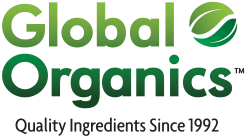Safeguarding Organic Integrity
02.06.2017 | Author: Global Organics | Category: Organic & Sustainability
Organic product sales hit $43 billion in 2015 and continue to grow. Unfortunately this surge in demand has opened doors for opportunistic companies to jump into the market. Some of these companies have no qualms about falsifying organic certificates. We’ve all heard stories of food imports with fake certificates.
In order to trust in the organic label you need to know that enforcement of organic regulations is taken seriously, and it is.
First of all, any commercial use of the word “organic" is regulated in the United States and backed by federal standards. Products cannot be marketed or sold as organic without certification according to requirements set up by the United States Department of Agriculture (USDA) and monitored by the National Organic Program (NOP). This is not like “natural” where label claims can be made without certification.
Becoming certified is a rigorous process where accredited certifying agents inspect every step in the production chain from growing to processing to packaging and labeling. Those involved must keep detailed records and undergo audits at every stage to ensure compliance with organic standards.
Inspections, announced or unannounced, make sure certified operators are complying with requirements. Auditors verify traceability from the fields to the end product and conduct mass balance verification to show the amount of product sold as organic corresponds to what was grown as organic. Also, at least 5% of NOP certified organic products are tested annually for residues of prohibited substances, including many pesticides.
Contamination and fraud are taken very seriously to maintain the integrity of organic products. The USDA enforces organic regulations and takes action against any farmers or businesses that violate that law. This helps consumers trust what they are getting when they purchase organic products. It also helps ensure the stability of your supply chain and the security of your brand reputation. No one wants to scramble for a new supplier after the discovery of fraudulent certificates or pesticide residues.
Violations to the organic regulations are punishable by fines of up to $11,000 per violation and/or suspension or loss of certification. Operators with suspended or revoked certifications can no longer sell, label or represent their products as organically produced or handled. As mentioned above, one major issue is false representing of conventional products or ingredients as certified organic by using fraudulent certificates. This can happen without the listed certifying agent’s knowledge or the distributor’s knowledge. Other infractions include failing to comply with all facets of the organic standards and misbranding or mislabeling products.
Since the US began disclosing records, 46 fraudulent organic certifications have been identified and publicly reported (USDA Agricultural Marketing Service). During the 12 months between October 2015 and September 2016, the USDA completed 357 complaint reviews and investigations. They also issued 31 cease and desist orders and 111 notices of warning (Compliance & Enforcement/Appeals Summary).
Though fraud is not very common, you should make sure you are working with organic ingredient suppliers that take steps to preserve the integrity of their ingredients, especially for imported products.
At Global Organics, we take the issue of fraud and contamination very seriously. Unlike a broker or trader who merely forwards documentation, our quality team personally verifies each of our suppliers and ingredients. They also work with third-party labs to test products for authenticity and potential contaminants (pesticides, heavy metals etc.). After our initial supplier approval process, we continue to work closely with our vendors to ensure the quality, safety and integrity of our products.
Click here to read more about Global Organics’ quality and food safety procedures



